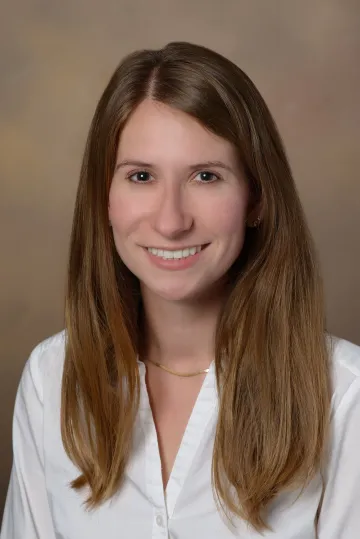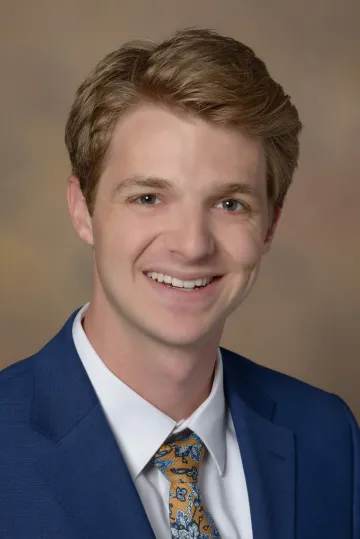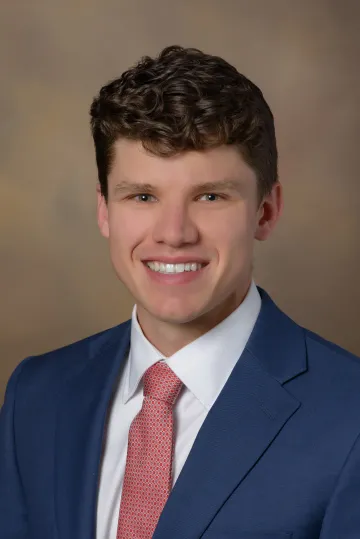Three Wyant College Students Named 2023-2024 ARCS Scholars

Three Wyant College Ph.D. students are receiving the prestigious recognition as 2023 ARCS Foundation Scholars. According to the ARCS Foundation Phoenix Chapter, their mission is to advance, "science and technology in the United States by providing financial awards to academically outstanding doctoral students studying to complete degrees in science, engineering and medical research."
Maggie Kautz, Colin Potter, and Christian Pluchar join seventeen previous years Wyant College ARCS scholars (full list below). The award recognizes the students' outstanding scientific achievements and awards the students each $8,500 from the Phoenix Chapter of ARCS® Foundation, Inc., and a $2000 fellowship, $500 travel grant and full tuition, if needed, from the Graduate College for the 2023-2024 academic year.
Also, uniquely, Professor Thomas L. Koch, Dean of the Wyant College of Optical Sciences, was a previous recipient at Princeton, his alma mater.
Read more about each of the scholars below.

ARCS Foundation
Maggie Kautz
Ponce Scholar
More about the Research
The Extreme Wavefront Control Lab is currently developing a cutting-edge extreme adaptive optics instrument, GMagAO-X, that will be a first light instrument for the up-and-coming 25.4 meter Giant Magellan Telescope. Due to its segmented nature (ie multiple mirrors put together, rather than one monolithic mirror) it is vulnerable to segment piston errors. I work on the High Contrast Adaptive-optics Testbed (HCAT) that will practice co-phasing the seven mirror segments of the GMT via piston control. I have designed a special 6-sided reflective optic with a hole through the center that will be used to split up the seven segments of the GMT so each segment can have its own dedicated piston and wavefront control line. In this new extreme AO architecture, each segment will have its own 3,000 actuator deformable mirror to control wavefront errors and its own piezoelectric mirror to control piston errors. Seven 3,000 actuator DMs working in parallel is equivalent to a 21,000 actuator DM which has never been seen before. This sort of new technology will enable the GMT to be one of the highest performance telescopes in the world.
About the Scholarship
I am very excited to meet the other ARCS Scholars and learn about the fascinating research they are working on. Building a network of quality researchers is always helpful in learning about new opportunities. I would like to thank my friends and family for always being supportive and uplifting even when I've been down for the count.
Long Term Goals
I am hoping to graduate soon and get a job with industry or a national lab, perhaps working on large ground based astronomical observing or in the field of solar energy. After that, who knows!

Colin Potter
Plenge Endowment Scholar
More about the Research
My research is on point-of-care biosensors for the diagnosis and quantification of disease. Recently, I developed a biosensor for SARS-CoV-2 using a simple agglutination assay, portable lens-free holographic microscopy, and machine learning. We achieved a sensitivity near that of traditional PCR methods within 3 hours and with a simple 1- or 2-step assay. This sensor is capable of quantifying complex samples consisting of large viral particles and cell debris through its machine learning algorithm, implicating its use as an assay for similarly complex human samples. Future work is directed at improving this sensor and expanding its application to other diseases.
About the Scholarship
Receiving this award is a great honor. I am excited for how this award will enable me to fully dive into the final aims of my doctoral research and grateful to the ARCS foundation for choosing to fund me, my research, and my future. I'd like to thank friends and family for their support, and everyone in the McLeod lab.
Long Term Goals
After completion of my PhD, I will go back to Medical School to complete my MD. Then, I will finish my clinical training in residency and begin looking for ways to use Optics and Engineering to improve healthcare delivery and disease treatment/diagnosis. My long term goal is to bring optical technologies into the clinic to solve clinical problems and improve the lives of patients.

Christian Pluchar
Nancy Berge Scholar
More about the Research
My research explores the quantum resolution limit of interferometry and other optical techniques. I became interested in this area of research after spending a summer working at the LIGO Hanford gravitational wave observatory. Quantum phenomena play an important role in LIGO: while LIGO has used states of light that can only be described by quantum mechanics (squeezed light) to improve the sensitivity, they are encountering the effects of the Heisenberg uncertainty principle, which will limit the precision of LIGO's measurements in the future. In our lab, we aim to test novel measurement schemes and platforms to explore many of the same concepts in table-top experiments with specially engineered macroscopic mechanical devices (but not nearly as big as the LIGO mirrors). These experiments will aid in the design of LIGO and other precision measurement experiments in the future. Additionally, by precisely measuring the motion of these devices, we can use feedback to steer them toward a desired quantum state. Preparing large mechanical devices in quantum states is important for experiments in fundamental physics, such as testing theories of quantum gravity, as well as for future quantum technologies. Recently, I have been working on studying the quantum limits of measuring the angular deflection of a mirror using various forms of deflectometry. This has a lot of similarities to the quantum limits of interferometry, but also heavily intersects with the field of quantum imaging.
About the Scholarship
Receiving the ARCS Award has been an enormous honor for me, and I'd like to thank the ARCS Foundation and my sponsor, Nancy Berge. Getting to know the ARCS Foundation and its members has been an uplifting experience: I've met many people who value my aspirations and research, as well as science and other young scientists. The award last year helped me attend a summer program in Les Houches, France, where I met peers conducting research in my field from all over the world, and the financial assistance the award provides has been valuable for completing my PhD.
Long Term Goals
I love both research and teaching physics, so any career opportunity that allows me to do one or both would be amazing. Staying in an academic setting would let me do both so that would be my first choice.
Past Wyant College ARCS Scholars
- Henry Quach
- Christian Pluchar
- Kevin Chew Figueroa
- David R. Carlson
- Benjamin Matthew Cromey
- Helen Xiang Fan
- Brandon M. Hellman
- Sawyer Miller
- Zachary L. Newman
- Shaun Michael Pacheco
- Timothy E. Renkoski
- Robert G. Richards
- Travis William Sawyer
- Lauren Schatz
- Brian M. Wheelwright
- Joshua Thomas Wiersma
- Amy Winkle
